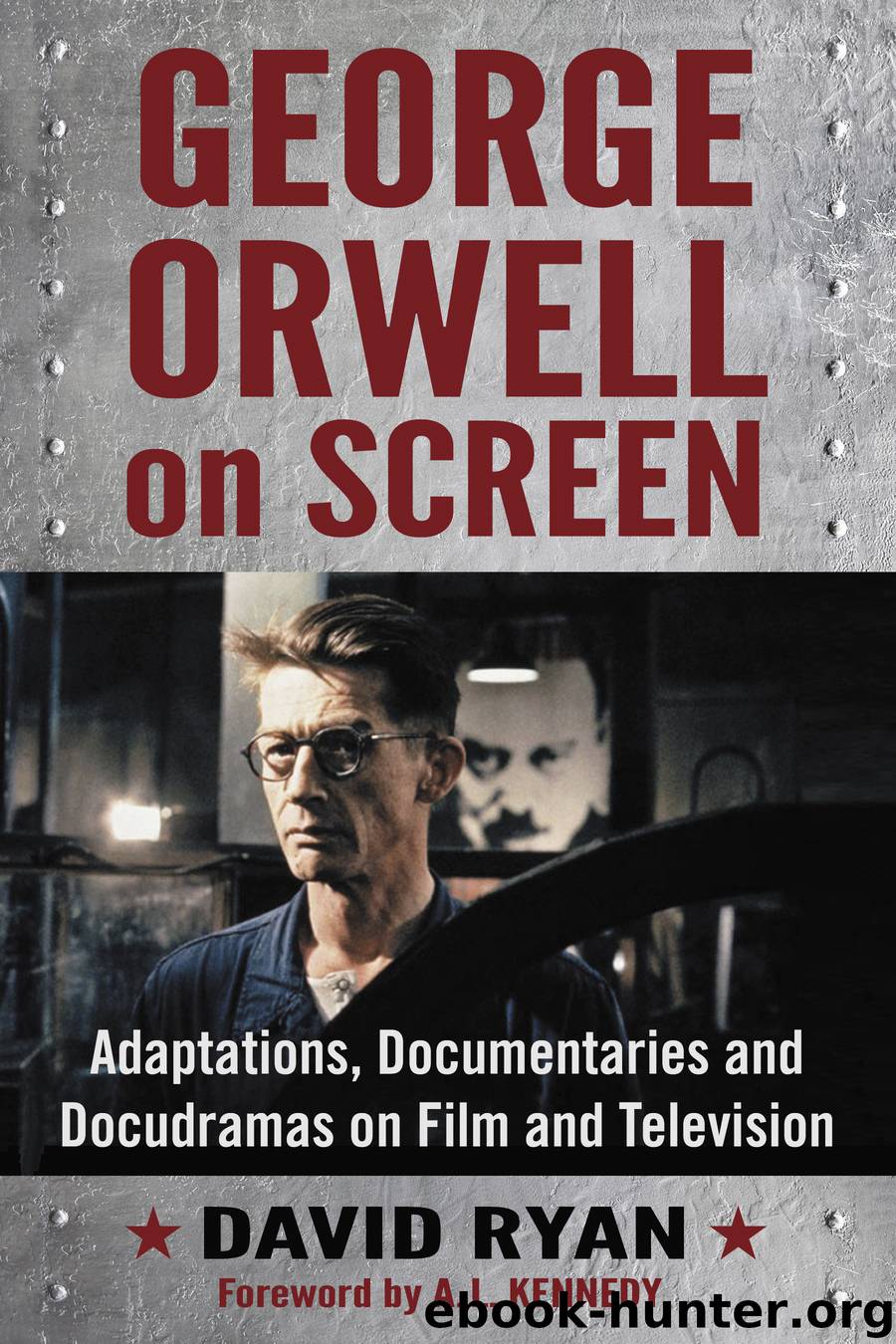George Orwell on Screen by David Ryan

Author:David Ryan
Language: eng
Format: epub
Publisher: McFarland
Published: 2018-09-05T16:00:00+00:00
13
The Road to 1984 (1984)
Like The Crystal Spirit, which aired a month earlier and met with more acclaim, commercial TV’s The Road to 1984 can boast location filming on Jura and a respected leading man. Apart from that, the two have little in common. Rather than present a wistful snapshot of Orwell’s final years, as the BBC chose to do, Granada Television’s biopic looks at his life in a broader context, from his service to the British Empire in Burma to his solitary, blood-soaked demise at University College Hospital, London.
On balance, writer Willis Hall and director David Wheatley have served up a useful primer on Orwell, cramming in most of the life-changing experiences you’d expect from such a venture. Granted, they stumble on occasion—piling flashback upon flashback in the opening 15 minutes and lumbering the actors with more exposition than is credible—but in many ways, their ambition does them credit.
After an attention-grabbing Two Minutes Hate ahead of the titles, the TV movie begins towards the end of his life, in 1949. His young fiancee, Sonia Brownell, is with the hospital chaplain, finalizing the paperwork for their wedding. Looking at the groom’s birth certificate, the cleric is surprised to see the name Blair. Isn’t he George something-or-other, the chap who wrote Nineteen Eighty-Four? “He writes under the name of Orwell,” says Sonia. “His real name’s Eric Arthur Blair.” Orwell, played by James Fox, remains in bed for the ceremony, wearing a red smoking jacket that Sonia’s bought him. A radio bulletin announces their marriage to the nation, with a precis of the novelist’s entire life to date.
As he sleeps restlessly later in the day, a nurse enters his private room and hangs his jacket in a wardrobe. He splutters and turns, and while she’s leaning over him, has a fever dream about Maurice, an Old Etonian homosexual he’d met as he lay in a flophouse one night. Keeping their dormitory awake with a rendition of the Eton Boating Song, Maurice offends Orwell by assuming he’s fallen on hard times. “I’m a writer,” says Orwell peevishly, his mind drifting between the two settings.
Before long, we’re into another flashback. Blair’s on a beach in 1920s Southwold, spelling out his literary ambitions to stuffy parents Richard and Ida. Dressed in a white linen suit and drawing insouciantly on a cigarette, he announces out of the blue that he’s resigned his police job in Burma to become a writer. Horrified, like her husband, at the thought of Eric chasing a pipe dream, his mother berates him. “No one can do just as they please,” she says—a nod, perhaps, to Orwell’s As I Please column in Tribune in the forties.
Download
This site does not store any files on its server. We only index and link to content provided by other sites. Please contact the content providers to delete copyright contents if any and email us, we'll remove relevant links or contents immediately.
| African | Asian |
| Australian & Oceanian | Canadian |
| Caribbean & Latin American | European |
| Jewish | Middle Eastern |
| Russian | United States |
4 3 2 1: A Novel by Paul Auster(11052)
The handmaid's tale by Margaret Atwood(6855)
Giovanni's Room by James Baldwin(5879)
Big Magic: Creative Living Beyond Fear by Elizabeth Gilbert(4723)
Asking the Right Questions: A Guide to Critical Thinking by M. Neil Browne & Stuart M. Keeley(4576)
On Writing A Memoir of the Craft by Stephen King(4214)
Ego Is the Enemy by Ryan Holiday(3991)
Ken Follett - World without end by Ken Follett(3973)
The Body: A Guide for Occupants by Bill Bryson(3802)
Bluets by Maggie Nelson(3711)
Adulting by Kelly Williams Brown(3671)
Guilty Pleasures by Laurell K Hamilton(3587)
Eat That Frog! by Brian Tracy(3514)
White Noise - A Novel by Don DeLillo(3436)
The Poetry of Pablo Neruda by Pablo Neruda(3367)
Alive: The Story of the Andes Survivors by Piers Paul Read(3312)
The Bookshop by Penelope Fitzgerald(3229)
The Book of Joy by Dalai Lama(3218)
Fingerprints of the Gods by Graham Hancock(3214)
